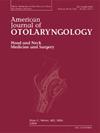Impact of patient-centered care (PCC)-based personalized interventions on postoperative pain management and recovery in children undergoing adenotonsillectomy: A retrospective study
IF 1.7
4区 医学
Q2 OTORHINOLARYNGOLOGY
引用次数: 0
Abstract
Objective
To evaluate the impact of patient-centered care (PCC)-based personalized interventions on postoperative pain management and recovery outcomes in children undergoing adenotonsillectomy.
Methods
A single-center retrospective cohort study was conducted at a tertiary hospital from January 2023 to March 2025, involving 216 children aged 3–12 years. Participants were divided into a PCC intervention group (n = 108) and a routine care group (n = 108). The PCC protocol included individualized pain education, non-pharmacological interventions (cold therapy, distraction techniques), and family-involved decision-making. Data on pain scores (FLACC/FACES scales), analgesic use, hospitalization duration, and complications within 48 h postoperatively were extracted from electronic medical records. Group differences were analyzed using repeated-measures ANOVA, multivariate regression, and subgroup analyses.
Results
The PCC group demonstrated significantly lower pain scores at 6 h, 24 h, and 48 h compared to controls (all P < 0.001). Daily acetaminophen and ibuprofen doses were reduced by 19.2 % and 55 %, respectively (both P < 0.001). Median pain relief time was 2.6 h shorter in the PCC group (3.2 h vs. 5.8 h, P < 0.001). Hospitalization duration decreased by 5.5 h (18.5 h vs. 24.0 h, P < 0.001), and overall complication risk was reduced (OR = 0.31, P < 0.001). Subgroup analysis revealed greater benefits in children aged 3–6 years, with a 28.6 % shorter hospitalization (P < 0.001).
Conclusion
PCC-based personalized interventions effectively alleviate postoperative pain, reduce analgesic dependence, and accelerate recovery, particularly in younger children. This model provides an evidence-based framework for optimizing pain management in pediatric ambulatory surgery.
以患者为中心的护理(PCC)为基础的个性化干预对儿童腺扁桃体切除术后疼痛管理和恢复的影响:一项回顾性研究
目的评价以患者为中心的个性化干预对儿童腺扁桃体切除术后疼痛管理和康复的影响。方法于2023年1月至2025年3月在某三级医院进行单中心回顾性队列研究,纳入216例3 ~ 12岁儿童。参与者分为PCC干预组(n = 108)和常规护理组(n = 108)。PCC方案包括个体化疼痛教育、非药物干预(冷疗法、分散注意力技术)和家庭参与决策。从电子病历中提取疼痛评分(FLACC/FACES量表)、镇痛药使用、住院时间和术后48 h内并发症的数据。采用重复测量方差分析、多元回归和亚组分析分析组间差异。结果PCC组在6 h、24 h和48 h的疼痛评分明显低于对照组(P <;0.001)。每日对乙酰氨基酚和布洛芬剂量分别减少19.2%和55% (P <;0.001)。PCC组中位疼痛缓解时间缩短2.6 h (3.2 h vs. 5.8 h, P <;0.001)。住院时间减少5.5 h (18.5 h vs. 24.0 h, P <;0.001),总体并发症风险降低(OR = 0.31, P <;0.001)。亚组分析显示,3-6岁儿童获益更大,住院时间缩短28.6% (P <;0.001)。结论以pcc为基础的个性化干预措施可有效缓解术后疼痛,减少镇痛依赖,加速术后恢复,尤其对低龄儿童疗效显著。该模型为优化儿科门诊手术疼痛管理提供了循证框架。
本文章由计算机程序翻译,如有差异,请以英文原文为准。
求助全文
约1分钟内获得全文
求助全文
来源期刊

American Journal of Otolaryngology
医学-耳鼻喉科学
CiteScore
4.40
自引率
4.00%
发文量
378
审稿时长
41 days
期刊介绍:
Be fully informed about developments in otology, neurotology, audiology, rhinology, allergy, laryngology, speech science, bronchoesophagology, facial plastic surgery, and head and neck surgery. Featured sections include original contributions, grand rounds, current reviews, case reports and socioeconomics.
 求助内容:
求助内容: 应助结果提醒方式:
应助结果提醒方式:


